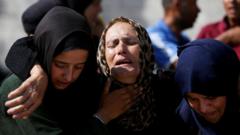Over 70 pro-Palestinian protesters were arrested at Columbia University on Wednesday after occupying Butler Library, leading to injuries among security staff and increased scrutiny from university officials and law enforcement.
Columbia University Sees Pro-Palestinian Protests Lead to Mass Arrests

Columbia University Sees Pro-Palestinian Protests Lead to Mass Arrests
Dozens are detained by NYPD after library occupation, sparking debates on protests and campus safety.
In a significant escalation of pro-Palestinian activism, dozens of protesters were arrested at Columbia University on Wednesday after they occupied the main library, Butler Library. The incident resulted in injuries to two university security officers and a quick response from law enforcement. University President Claire Shipman described the actions of the protesters as "outrageous," noting that many participants were not current students.
Videos circulated on social media depicted a large group of protesters, many clad in keffiyehs and masks, forcefully entering the library while chanting slogans. This demonstration occurred despite a longstanding ban imposed during the Trump administration aimed at controlling campus protests. Following the incident, Shipman requested assistance from the New York Police Department (NYPD), revealing persistent tensions surrounding the university’s handling of dissent and its students' well-being.
Reportedly more than 70 arrests were made, and the NYPD confirmed on social media that they responded to specific requests from the university to address individuals trespassing on campus. Footage from the scene captured protesters defacing library property, with messages such as "free Palestine" chalked onto bookshelves. The protest disrupted the academic environment just as students prepared for final exams, prompting President Shipman to urge students to avoid the library during the unrest.
In response, New York City Mayor Eric Adams weighed in on the situation via social media, emphasizing that the city would not tolerate violence or hate in any form. The protesters, branding their actions as a response to alleged "violent repression" by the administration, refused to comply with requests to show identification to law enforcement.
This protest marks a notable moment for Columbia University, which has faced intense scrutiny regarding its stance on protests following previous movements related to the conflict in Gaza. The incident aligns with broader discussions surrounding the Trump administration's threats to withdraw federal funding from universities over allegations of antisemitism and mishandling of campus protests.
Universities across the U.S. have faced similar pressures, and the situation at Columbia is being closely watched as indications emerge of potential policy influences from federal authorities. As tensions rise, the university community grapples with shifting dynamics surrounding activism, security, and institutional accountability.




















